
The Three Stooges were an American vaudeville and comedy team active from 1922 until 1970, best remembered for their 190 short-subject films by Columbia Pictures. Their hallmark styles were physical, farce, and slapstick comedy. Six total Stooges appeared over the act's run ; Moe Howard and Larry Fine were mainstays throughout the ensemble's nearly 50-year run, while the "third stooge" was played in turn by Shemp Howard, Curly Howard, Shemp Howard again, Joe Besser, and "Curly Joe" DeRita.

Ted Healy was an American vaudeville performer, comedian, and actor. Though he is chiefly remembered as the creator of The Three Stooges and the style of slapstick comedy that they later made famous, he had a successful stage and film career of his own and was cited as a formative influence by several later comedy stars.
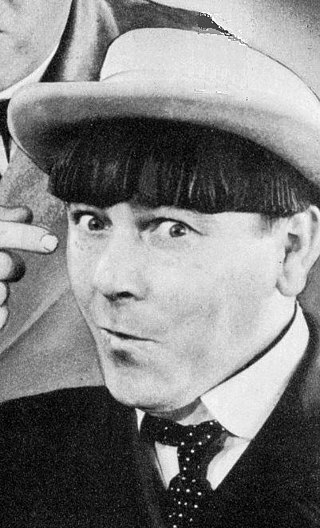
Moses Harry Horwitz, better known by his stage name Moe Howard, was an American comedian and actor. He is best known as the leader and straight man of the Three Stooges, the farce comedy team who starred in motion pictures and television for four decades. That group initially started out as Ted Healy and His Stooges, an act that toured the vaudeville circuit. Moe's distinctive hairstyle came about when he was a boy and cut off his curls with a pair of scissors, producing an irregular shape approximating a bowl cut.
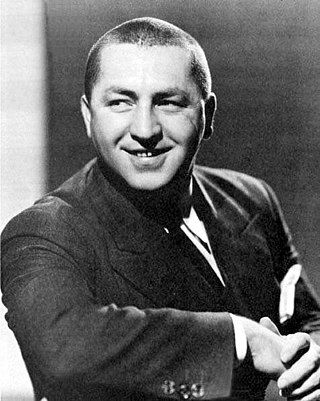
Jerome Lester Horwitz, better known by his stage name Curly Howard, was an American comedian and actor. He was a member of the comedy team The Three Stooges, which also featured his elder brothers Moe and Shemp Howard, as well as actor Larry Fine. In early shorts, he was billed as Curley. Curly Howard was generally considered the most popular and recognizable of the Stooges.

Swing Parade of 1946 is a 1946 musical comedy film directed by Phil Karlson and released by Monogram Pictures. The film features Gale Storm, Phil Regan, The Three Stooges, Edward Brophy, and musical numbers by Connee Boswell and the Louis Jordan and Will Osborne orchestras, including "Stormy Weather" and "Caldonia".

Have Rocket, Will Travel is a 1959 American science-fiction comedy film released by Columbia Pictures and starring the Three Stooges, consisting of Moe Howard, Larry Fine and new addition Joe DeRita. The film was produced to capitalize on the Three Stooges' late-1950s resurgence in popularity. The supporting cast features Anna-Lisa and Robert Colbert.

You Nazty Spy! is a 1940 comedy film directed by Jules White and starring American slapstick comedy team The Three Stooges. It is the 44th short film released by Columbia Pictures starring the comedians, who released 190 short films for the studio between 1934 and 1959.

Nertsery Rhymes is a 1933 American Pre-Code musical comedy short film starring Ted Healy and His Stooges, released on July 6, 1933 by Metro-Goldwyn-Mayer. It is the first of five short films the comedy team made for the studio.

Beer and Pretzels is the second of five short films starring Ted Healy and His Stooges released by Metro-Goldwyn-Mayer on August 26, 1933. A musical-comedy film, the film also featured Bonnie Bonnell, Healy's girlfriend at the time.

Bonnie Bonnell was an actress who played "straight woman" in seven early short comedies, most of which featured the Three Stooges when they worked with Ted Healy, between 1933 and 1934.
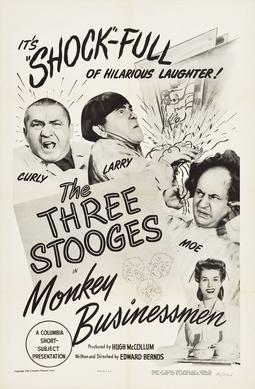
Monkey Businessmen is a 1946 short subject directed by Edward Bernds starring American slapstick comedy team The Three Stooges. It is the 92nd entry in the series released by Columbia Pictures starring the comedians, who released 190 shorts for the studio between 1934 and 1959.

Three Little Pirates is a 1946 short subject directed by Edward Bernds starring American slapstick comedy team The Three Stooges. It is the 96th entry in the series released by Columbia Pictures starring the comedians, who released 190 shorts for the studio between 1934 and 1959.
The March of Time is the title of an unreleased 1930 American pre-Code musical film directed by Charles Reisner. The film was originally scheduled to be released in September 1930 by Metro-Goldwyn-Mayer (MGM) but was shelved. The March of Time would have been one of the many musicals partially filmed in two-color Technicolor.

Broadway to Hollywood is a 1933 American pre-Code musical film directed by Willard Mack, produced by Harry Rapf, cinematography by Norbert Brodine and released by Metro-Goldwyn-Mayer. The film features many of MGM's stars of the time, including Frank Morgan, Alice Brady, May Robson, Madge Evans, Jimmy Durante, Mickey Rooney, and Jackie Cooper. Brothers Moe Howard and Curly Howard of The Three Stooges appear—without Ted Healy and without Larry Fine—almost unrecognizably, as Otto and Fritz, two clowns in makeup. It was the first film to feature Nelson Eddy.

Plane Nuts is the fourth of five short subjects starring Ted Healy and His Stooges released by Metro-Goldwyn-Mayer on October 14, 1933. A musical-comedy film, the short also featured Bonnie Bonnell as Healy's love interest. The Stooges were billed as "Howard, Fine and Howard."
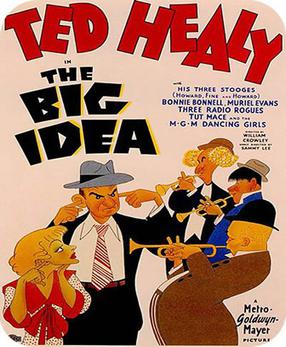
The Big Idea is the fifth and last of five short films starring Ted Healy and His Stooges released by Metro-Goldwyn-Mayer on May 12, 1934.

Meet the Baron is a 1933 American pre-Code comedy film starring Jack Pearl, Jimmy Durante, Edna May Oliver, ZaSu Pitts, Ted Healy and His Stooges. The title of the film refers to Pearl's character of Baron Munchhausen, which he made famous on his radio show.

Myrt and Marge is a 1933 American pre-Code Universal Studios feature film, starring Myrtle Vail and Donna Damerel. The film is noteworthy today because it co-stars Ted Healy and his Stooges, shortly before the trio split from him and became the Three Stooges. The team included Bonnie Bonnell, who was a short-lived female Stooge.
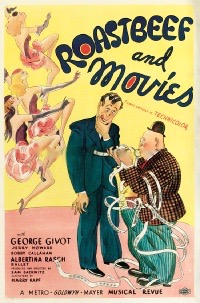
Roast-Beef and Movies is a short subject starring George Givot, Curly Howard, Bobby Callahan, and the Albertina Rasch Dancers, released by Metro-Goldwyn-Mayer (MGM) on February 10, 1934. The music is by Dimitri Tiomkin, who was married to Rasch at the time.

The Three Stooges is an American biographical comedy television film about the slapstick comedy team The Three Stooges directed by James Frawley. The film was entirely shot in Sydney, Australia. It was broadcast on ABC on April 24, 2000.



















